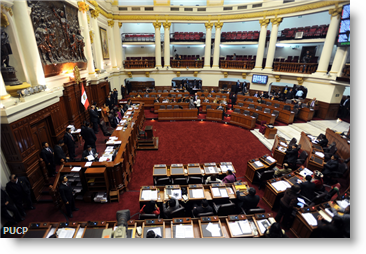 Peruvian lawmakers yesterday rescinded government legislation to create a new youth labor code, after heavy backlash from student organizations and union groups.
Peruvian lawmakers yesterday rescinded government legislation to create a new youth labor code, after heavy backlash from student organizations and union groups.
The legislation, which became known as the “Ley Pulpin,” was at the center of a number of street protests over the last few weeks by students and unions who say it would curb the labor rights of young men and women.
The government had argued that the law was necessary in order to facilitate formal employment for youth, most of whom work in the unregulated, informal sector.
A vote on Monday to repeal the law was passed with 91 votes in favor, 18 against and five absentees, according to daily El Comercio. Not even President Humala’s own ruling party, Gana Peru, was able to muster its 43 members to keep the law in place. In fact, a key young lawmaker, Sergio Tejada, resigned from the party last week, the Youth Labor Law his final reason.
On Tejada’s resignation, which weakens Gana Peru’s bargaining power in Congress, President Humala said “it doesn’t look good” just 12 months before general elections. “Politicians need to learn to cultivate loyalty and discipline,” Humala said.
Daniel Abugattas of Gana Peru, who said Tejada used the labor law just as an excuse to resign, accused those in favor of repealing the law of “committing treason against two million young people.”
On Tuesday, during a visit to Pacaran in Cañeta south of Lima, President Ollanta Humala said that Congress is now responsible for coming up with an alternative to the now defeated legislation.
“Unfortunately, any alternative that could come from Congress won’t be ready this year,” Humala said.
The aim of the law, enacted in mid-December, is to create more temporary jobs for young men and women between the ages of 18 and 24, particularly focused on providing training and working experience to those who otherwise would not have any opportunities of obtaining higher technical or professional education.
But the law, which was said to have been drafted with the help of the private industry confederation, Confiep, was seen as kowtowing to the business sector to provide cheap labor.
There were also fears that businesses wouldn’t incorporate any of these young workers into their permanent workforce once they turn 25 —instead replacing them with a fresh lot of 18-24 year olds— or that older employees who enjoy full work benefits would be fired in order to hire the less expensive, shorter-term young people.
In January and December, opponents of the law had clashed with police during demonstrations in central Lima and other parts of the city.
The law is one of several measures the government has passed over the past year to try and support a recovery in the economy, which has been hurt by lower demand for its commodity exports.
The repeal of the law is the latest blow to President Humala’s administration, which has been tarnished lately by accusations of spying on politicians.
Humala, who took office in July 2011, has about 18 months left in office.






Welcome to more chaos as the value of the sole continues to drop.
What Peru needs is a quality public school educational system so that young people entering the work force will be prepared for employment in [formal] industries that have high value per worker output. Assuming that Peru can attract such industries to Peru. This requires profound structural/cultural changes = much less corruption, respect for the law, order, etc.,etc.